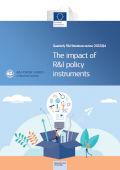Quarterly research and innovation literature review: The impact of R&I policy instruments
Details
- Publication date
- 8 March 2023
- Author
- Directorate-General for Research and Innovation
Description
The primary argument for public support of innovation is that of market failure. For example, due to the large positive externalities associated with R&D, the social return of innovation is often larger than the private one, leading private firms to under-invest in R&D. The extra profits of firms investing in R&D do not fully reflect the social benefits of the R&D. This is because other firms can benefit from spillovers from these investments as they copy the innovation and/or build on the knowledge created by the inventor’s R&D. Moreover, domestic and foreign consumers will get the innovation benefits at a tiny fraction of the (full) costs.
At the same time, network failures and coordination failures may arise in the innovation ecosystem preventing innovation from diffusing freely in the economy and limiting the social gains of innovation.
A vibrant innovative economy is part of what we need to tackle the climate crisis and succeed with the transition to net-zero. Almost half of the reductions in CO2 needed to reach the 2050 targets need to come from technologies that are not yet available.
The European Union deploys a wide set of research and innovation policies in order to promote private sector engagement in R&I activities, support cross-border and public-private research cooperation, and encourage human capital development.
A fundamental part of policymaking is to evaluate the impact of the deployed policies to understand what has worked and what has not, learn and improve based on the lessons learned.
This literature review looks into recent papers that evaluated the impact of a wide set of EU innovation policy tools of the Seventh Framework Programme (FP7) and the Eight Framework Programme (Horizon 2020).
Contributors: Valentina Di Girolamo, Alessio Mitra, Océane Peiffer-Smadja, Julien Ravet and Jan-Tjibbe Steeman

